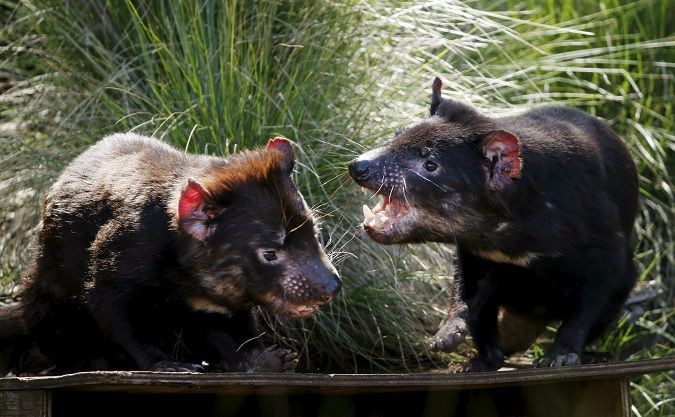Can Humans Evolve To Resist Cancer Cells? Tasmanian Devils' DNA Is Changing To Fight Off Deadly Disease

The tasmanian devil population has declined by an estimated 80 percent since 1996 because of an aggressive and contagious form of cancer. In Tasmania, the only place in the world where the small animals live, the marsupials are facing devil facial tumor disease (DFTD), a nearly 100 percent fatal and transmissible cancer. Their prospects of developing the disease — or resisting it — raise hope that someday human beings may be able to resist cancer cells.
A new study has just been published suggesting that some Tasmanian devil populations are evolving genetic resistance to DFTD, which could help the species avoid extinction.
"Our study suggests hope for the survival of the Tasmanian devil in the face of this devastating disease. Ultimately, it may also help direct future research addressing important questions about the evolution of cancer transmissibility and what causes remission and reoccurrence in cancer and other diseases,” said Andrew Storfer, study author and Washington State University professor of biology.
So, what does this mean for evolution of humans and other mammals? Results of the new tasmanian devil study could direct future research on cancer remission and recurrence. Additionally, scientists can look at how animals evolve rapidly in response to the disease and other pathogens.
"If a disease comes in and knocks out 90 percent of the individuals, you might predict the 10 percent who survive are somehow genetically different," said study co-author Paul Hohenlohe, assistant professor of biology at the University of Idaho. "What we were looking for were the parts of the genome that show that difference."
DFTD is one of only three known forms of transmissible cancer and definitely the most deadly. The disease first appears as clusters of lesions and lumps around the tasmanian devils' mouths before metastasizing and covering the creatures' whole faces in angry red welts. Eventually, the tumors inhibit the animal’s ability to eat, and sometimes even suffocate.
Source: Storfer A, Hohenlohe P. Tasmanian devils Evolve To Resist Deadly Cancer. Nature Communications . 2016.
Read more:
New Form Of Contagious Cancer Discovered In Tasmanian Devils: What This Means For Humans
Cancer Risks 2016: Excess Weight Tied To 8 More Types Of Cancer Than Previously Thought
Published by Medicaldaily.com



























